The 12 most surprising things we learned by playing Fallout 76
Treasure maps, player assassination missions built into your Pip-Boy, the mysterious Mothman, and more.
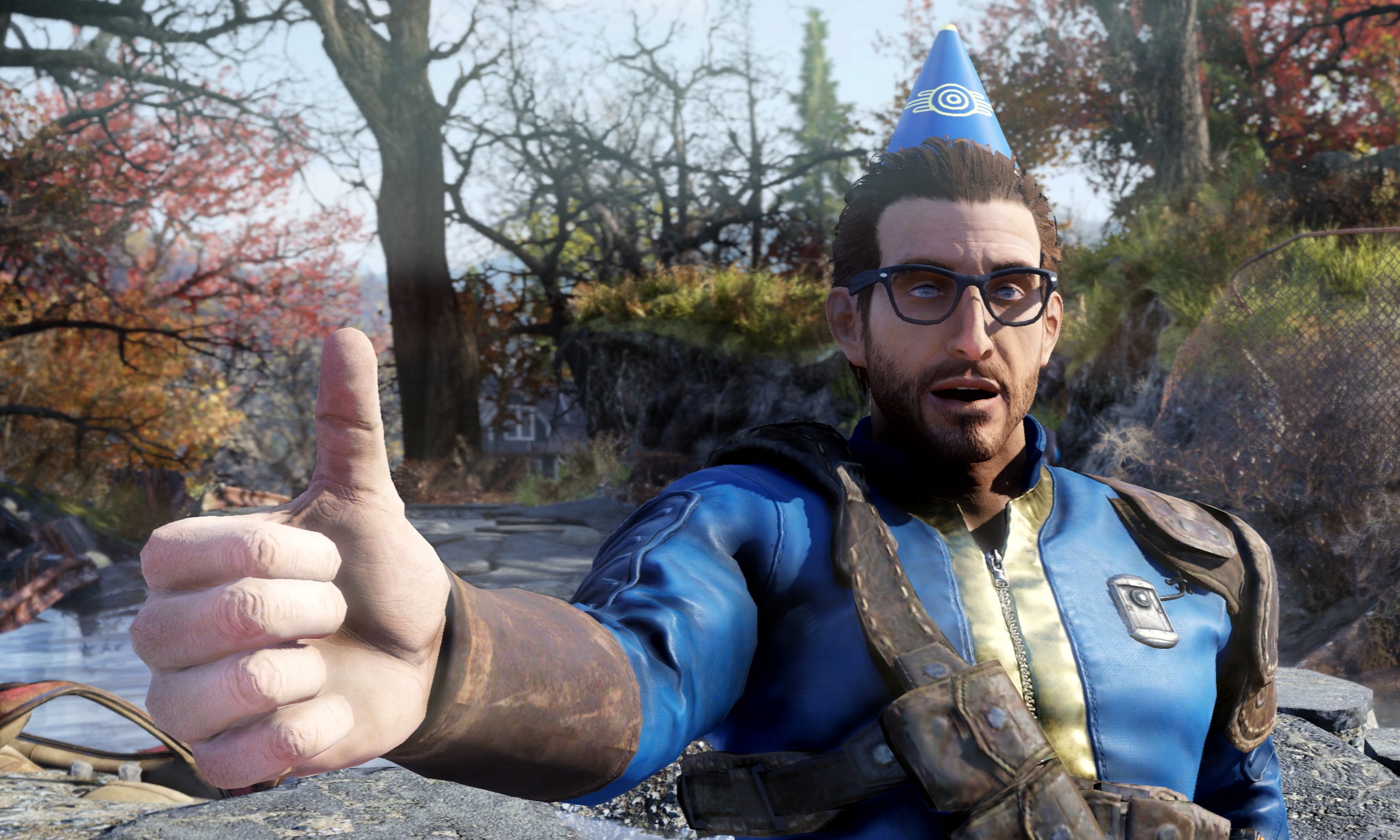
Bethesda hosted an event at the Greenbrier Resort in West Virginia last week, giving us our first hands-on time with Fallout 76 ahead of the beta (plus a chance to visit an in-game location for real, because the Greenbrier is actually in the game). The build we played on Xbox One and not PC, unfortunately, but we still got three hours of time with the online RPG which launches on November 14th.
We began with completely new characters stationed inside Vault 76, and were assigned to a team but invited to leave the vault and do pretty much whatever we wanted. Austin and Chris each spent about 90 minutes playing (they shared a character in the time-honored fashion of swapping the controller back and forth). Here's what surprised us the most in our time with Fallout 76.
It's easy to forget it's a multiplayer game

Chris: I was pretty skeptical going in, but fans of the traditional singleplayer Fallout games don't need to worry. Fallout 76 still feels like a Fallout game, to the degree that even though we were at an event sitting in a roomful of other people all playing on the same server with us, I would routinely forget it wasn't a singleplayer game. I'd open my Pip-Boy or skill cards and just kind of take a leisurely browse through them, and then I'd see a damage indicator because some ghoul had run up and starting clawing my face apart. And it's like, oh yeah: the world isn't put on pause when I'm looking through a menu. It's easy to forget that, because 76 feels a lot like Fallout 4.
Austin: Not 30 minutes after I exited Vault 76, I was stealthing my way through a rundown house looking for garbage to tape to my gun. I was rationing stimpaks, listening for ghouls, and constantly sifting through my favorited items looking for something with ammo. That's Fallout to me, and that's how Fallout 76 felt. In many ways, it really is Fallout 4: Again. The crafting, shooting and building are virtually identical, which I'm fine with. The world feels new and there are plenty of things to do in it, which is all I was really hoping for. To be honest, I didn't even notice the lack of story NPCs. I picked up so many quests just by examining things and discovering areas that I was never short on things to do.
The only instanced areas are loot containers
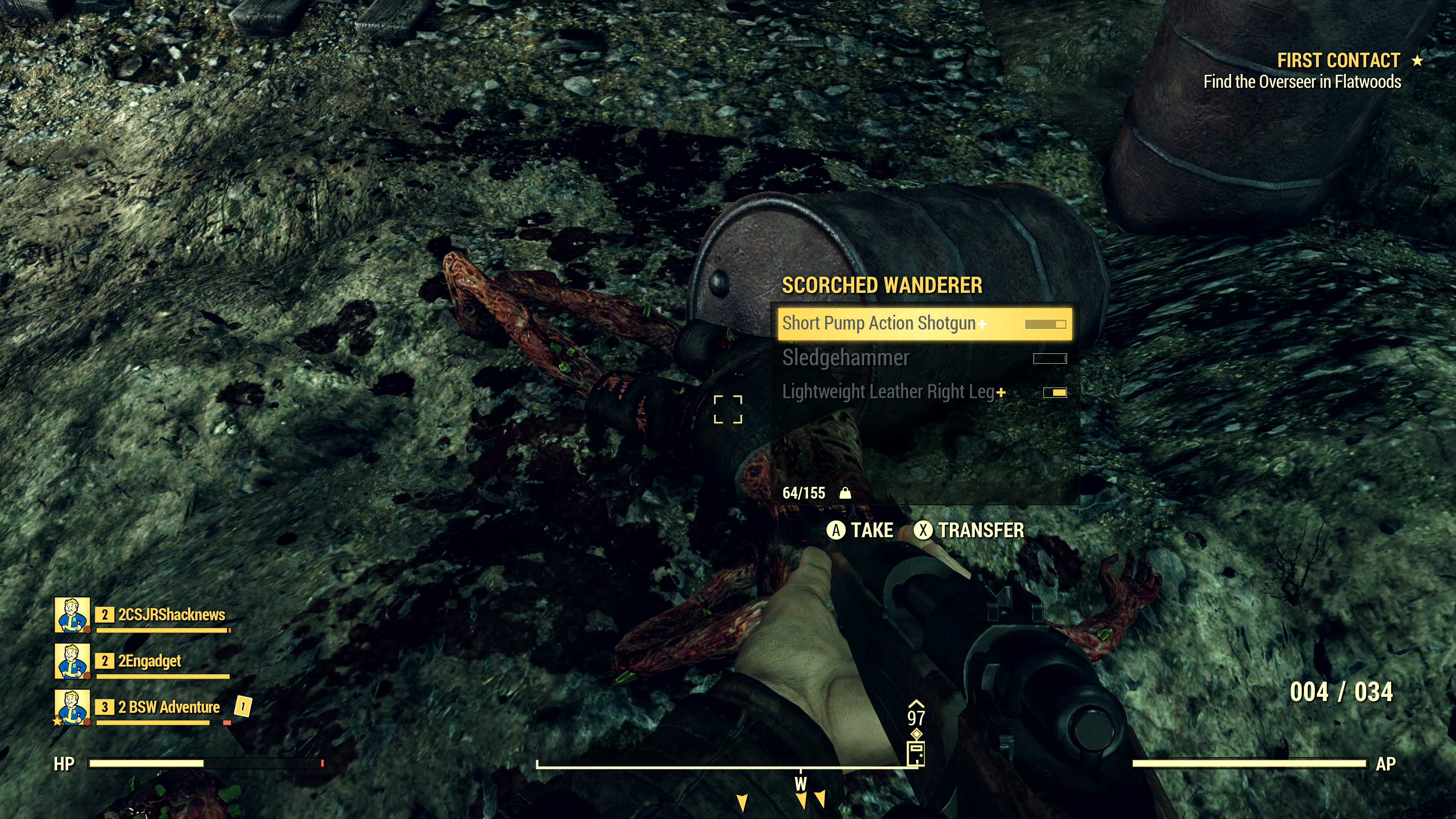
Chris: Dungeons and interior areas aren't instanced, they're shared spaces just like the outer world. "We decided to keep the game as one-world as possible so everyone's experiencing the same thing," said project lead Jeff Gardiner. "We actually had that on our loot containers for a while. And we found that you'd find empty loot containers, and it's a very unsatisfying experience so we made those instanced. But that's about the only instanced content in the game that I'm aware of, is the loot containers."
Loot containers include dead bodies as well. If you participate in killing a creature, not only will you get the same XP as everyone else, you'll also find loot on it just as everyone else does. This doesn't hold true for lootable objects like desk fans and clipboards and other stuff lying around on table tops, but everyone gets their own version of loot when you open a crate (or inspect a corpse).
Austin: I didn't learn this until after my time with the demo, and I wish I'd known beforehand because I deliberately left some guns and ammo behind for my teammates. Giving everyone their own loot feels like the right call. It avoids the Borderlands problem of begrudgingly rationing loot chests, and it has the upside of you and your friends receiving different stuff which you can trade each other for. There are about a billion potential modifiers on the legendary gear dropped by bosses, and even if you don't get a god roll laser rifle, your friend might.
Keep up to date with the most important stories and the best deals, as picked by the PC Gamer team.
There's a player assassination game in your Pip-Boy
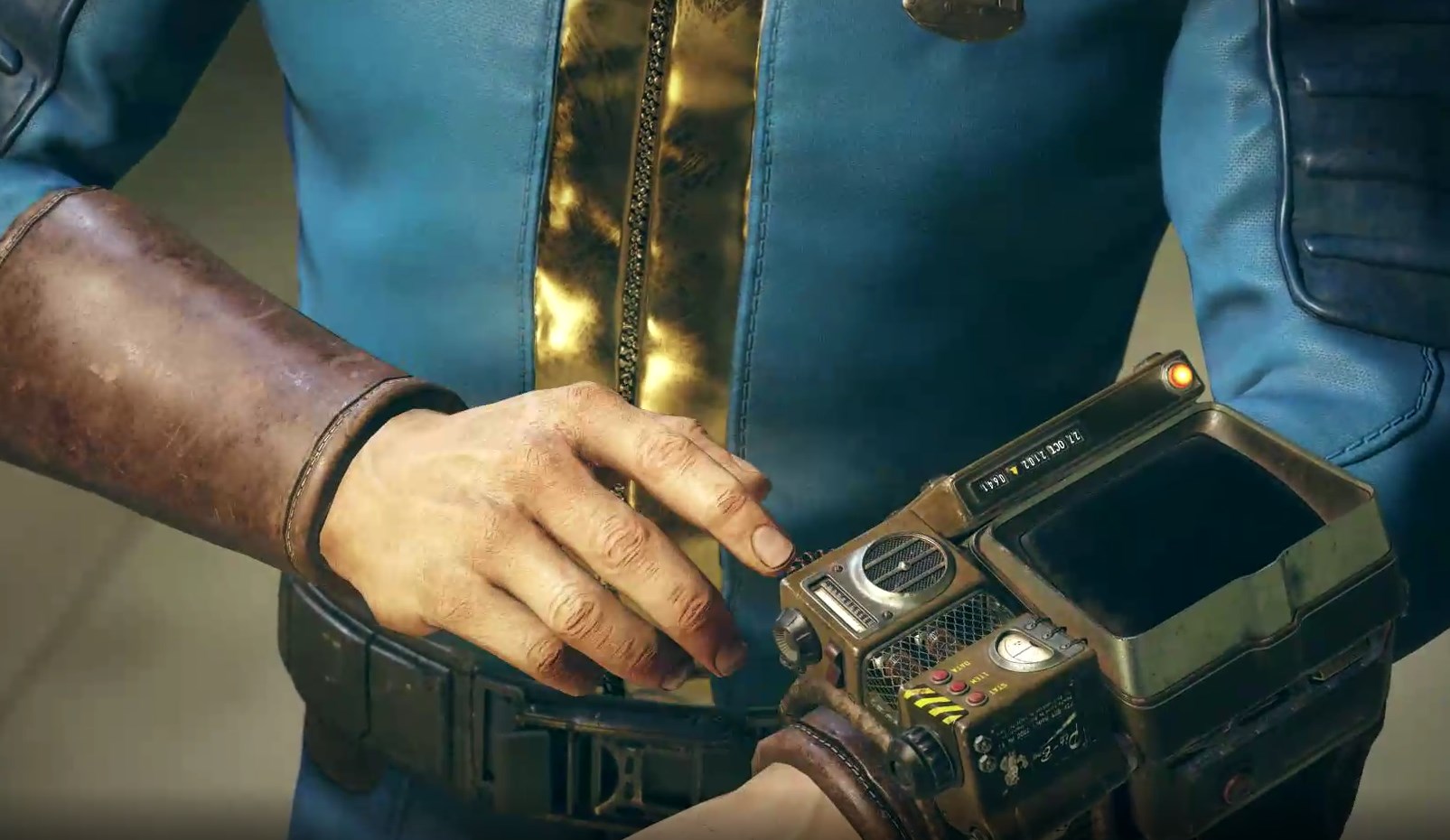
Chris: PvP isn't just limited to random encounters. "There's also a game in the Pip-Boy called Hunter/Hunted," Jeff Gardiner told us, calling it "a really cool game of assassination." You can tune it in like a radio station wherever you are on the map.
"You get a target," Gardiner sold us. "If you opt in, you become an assassination target and you get to assassinate someone else, so it's that round robin sort of game of assassination, and it adds a lot of tension to your game."
Austin: I play Fallout games to explore and get lost, so I don't have much interest in the PvP in Fallout 76. I'll probably keep to myself for the most part, but I like PvP in other games and I have to admit Hunter/Hunted actually sounds like a lot of fun. I like that it's totally optional because it gives PvP devotees their own private deathmatch which won't affect players who just want to build and craft stuff. Plus, there's just something exciting about choosing to put a bounty on your own head.
When you opt into Hunter/Hunted, you're basically spawning a super threatening enemy somewhere in the world. Suddenly there's a bullet out there with your name on it, so every random gunshot or slammed door is going to scare the bejesus out of you in a way it wouldn't otherwise. I would love to see Hunter/Hunted turn into a feature where, after crafting a bunch of gear and tweaking your perk loadout, you sign up for a round of assassinations to test it out. As long as I can explore on my own time, I reckon I could get into that.
I saw Mothman! (Sort of)
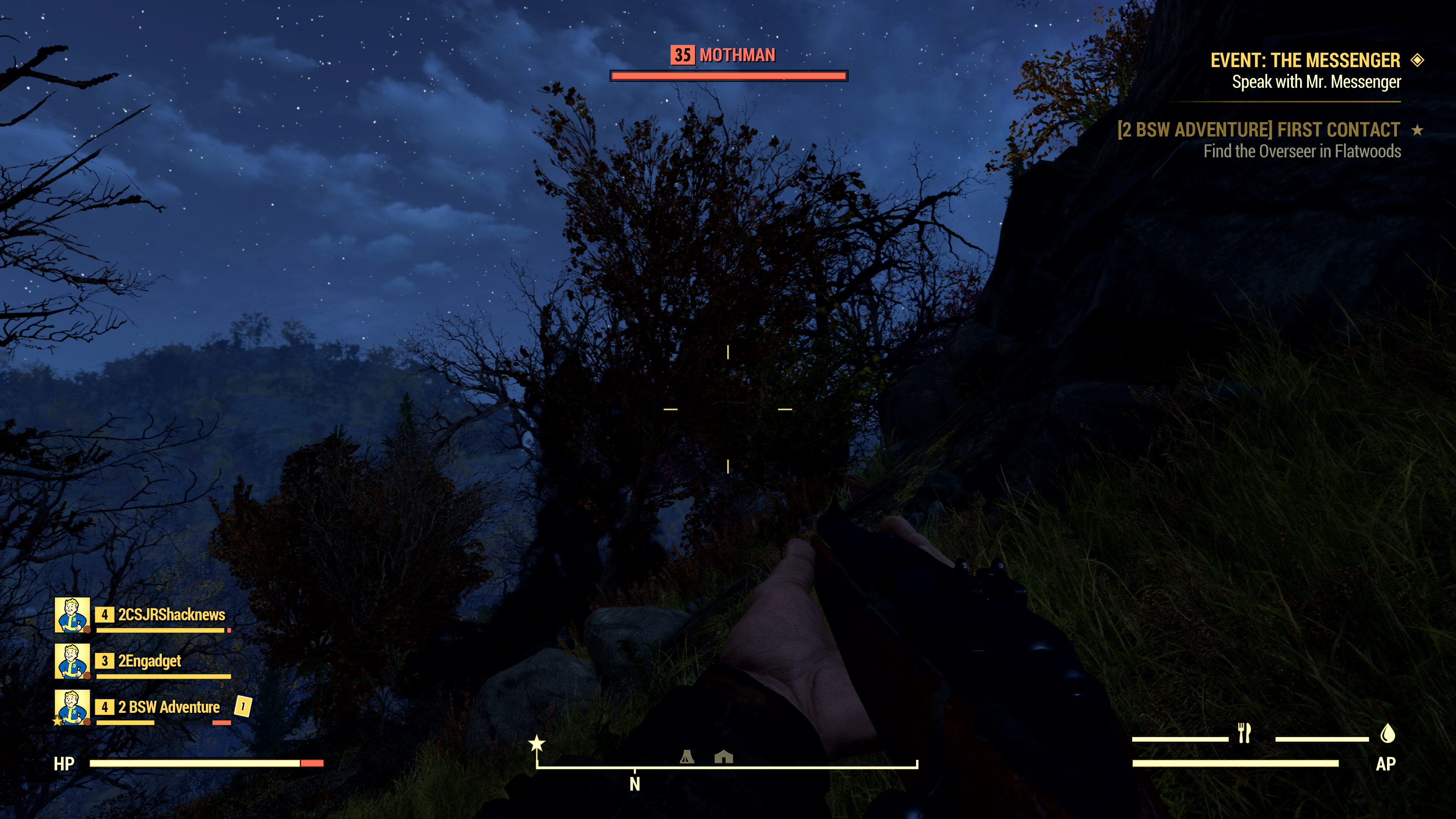
Chris: I'm apparently one of the few in attendance at the Fallout 76 hands-on event to have seen a Mothman (or the Mothman, if there is just one—perhaps there are Mothmen). And it was only for the briefest of moments while running around alone in the dark.
While exploring a hilltop alone, I heard an ominous music cue. That's when I looked to my right (or left) and saw him. Mothman! Well, to be completely honest, I didn't really see Mothman. I saw the words "Mothman" on my screen, thanks to Bethesda's continued insistence on identifying every enemy you look at by displaying their name in red capital letters, even if you've never met them before or if you haven't technically spotted them with your actual eyeballs.
Which in some respects is a bit of a buzzkill. Creepy music and glowing eyes in the darkness: spooky as hell! Creepy music and the instant text-based identification of a Mothman you can't actually see: well, it was still pretty exciting, but perhaps not the best way to introduce what may be the most mysterious creature in the game. I called to my teammates, but Mothman, who I didn't really see, was already gone.
There's damage resistance scaling for PvP
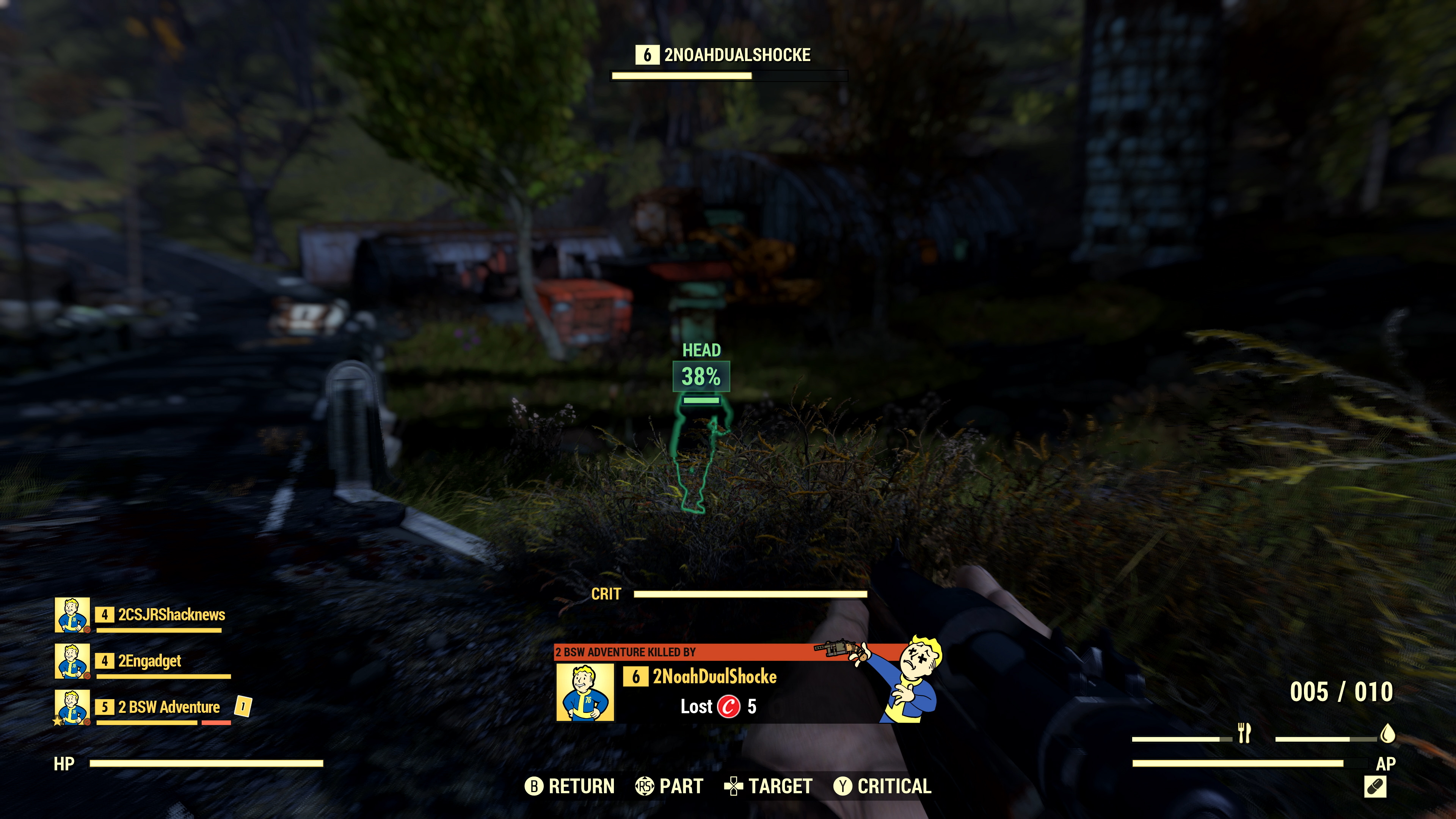
Chris: What happens when a high-level character and a low-level character get into a PvP fight? It may not be as simple as the high-level character winning every time. There's a bit of scaling when it comes to PvP, what Jeff Gardiner called a "damage normalization formula". If a level 50 character fights a level 10 character, the higher level character's damage resistance won't be as effective as it normally would be, which at least gives the lower-level character a fighting chance at victory.
This doesn't hold true of encounters between players and AI enemies, just in PvP. It also doesn't mean a higher level character will be at a disadvantage. "As in the other Fallout games a lot of it is inventory management," said development director Chris Mayer. "You can afford the good stuff, so if that level 50 player, he's been around the game world a lot longer, he might have a Fat Man in his inventory with a couple of shells and more powerful weapons, so he will have more resources available to withstand the battle."
Those player-launched nukes aren't messing around
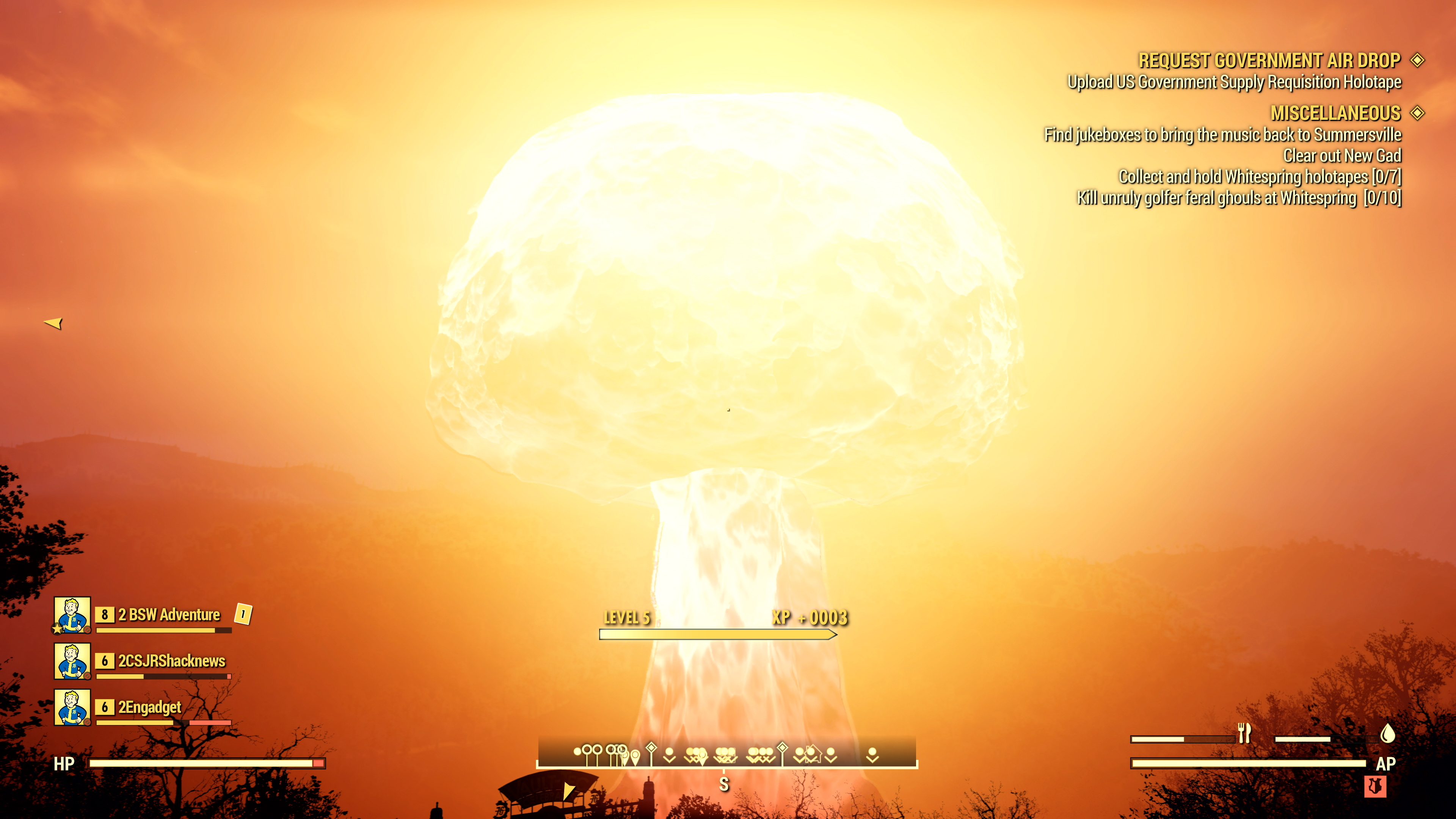
Austin: I get it, nukes are powerful. I mean, they're called weapons of mass destruction, and the devastation they can cause is pretty much the premise of Fallout. Even so, I was pretty impressed with the sheer power of the nukes players can fire off in 76. It really is the sort of thing games wouldn't normally let players wield. There's a dramatic whine as the bomb falls from the sky, then trees soar through the air like leaves in the wake of an explosion which sends up a towering mushroom cloud. That sure is a nuke, all right.
I happened to be playing when we watched a nuke drop, so naturally I immediately ran headlong into the fallout and died of exposure. I didn't get to see much—turns out you need more than one (diluted) dose of rad-away and some rad-x to survive a nuke—but I did get to preview the effect nukes have on the environment. Everything in the blast radius was deader than hell, and the air was thick with amber smog. I look forward to getting some proper radiation gear and investigating the aftermath more thoroughly.
Charisma is super important
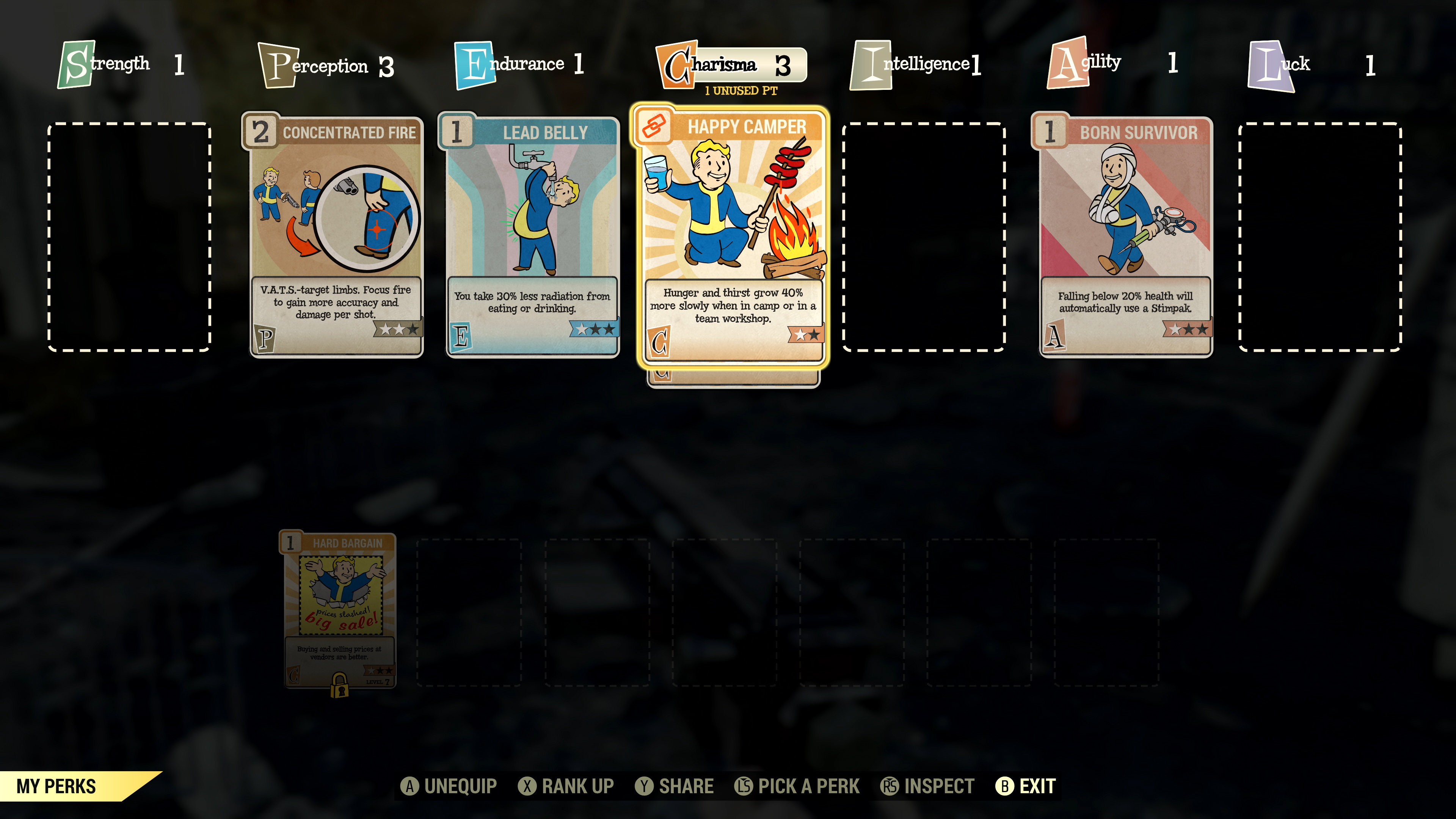
Austin: The usefulness of Fallout's Charisma stat fluctuates with every game, and thanks to its card-based perk system Fallout 76 leans on it hard. Simply put, Charisma allows you to share the benefits of the perk cards you have equipped with your teammates. Every card has a point cost of one to three, and as long as your Charisma level is at least three times the cost of a card you have equipped, your teammates will also benefit from that card.
Let's look at an example. If I equip a one-point card that gives me five percent more experience, as long as I have three Charisma, my friends will get bonus experience too. If I upgrade that card so it gives 10 percent bonus exp and costs two points, I'll need six Charisma to share its effects. This system adds another layer of strategy to allocating perk cards and SPECIAL stats—even if that strategy is just, 'Get nine Charisma for the love of god'—and it means playing with friends can provide a huge power boost.
There are lots of server-wide events
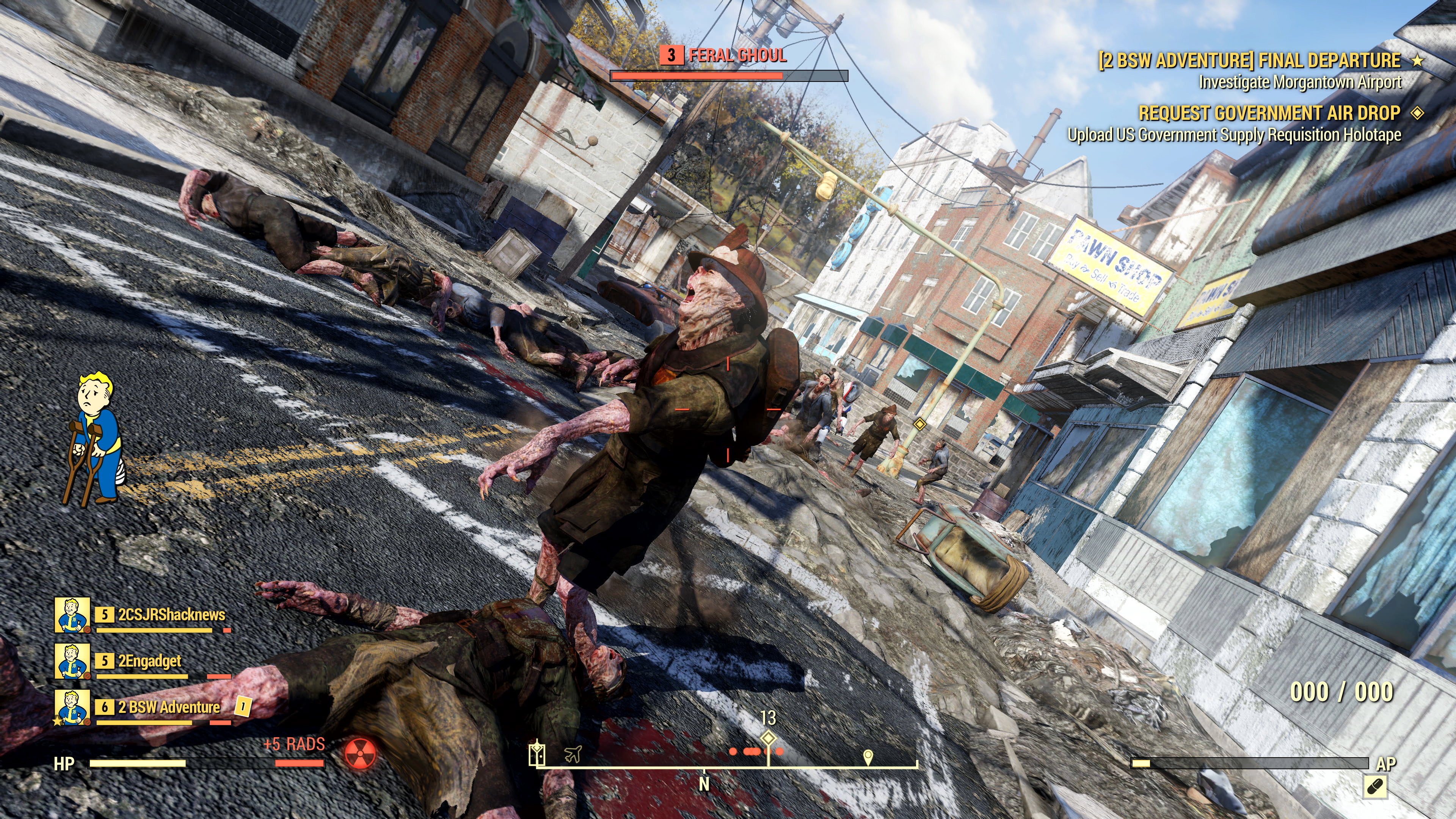
Chris: And you can fast travel to them, which is convenient but feels almost like cheating. I saw an event on the map, far north of the area I was in at the time. I fast-traveled there, and immediately died trying to solo the event, which involved escorting a robot through a town utterly swamped with feral ghouls. But having died I could respawn nearby, thus giving me access to an area that would have taken me ages to reach on foot.
It has Red Dead-style treasure maps
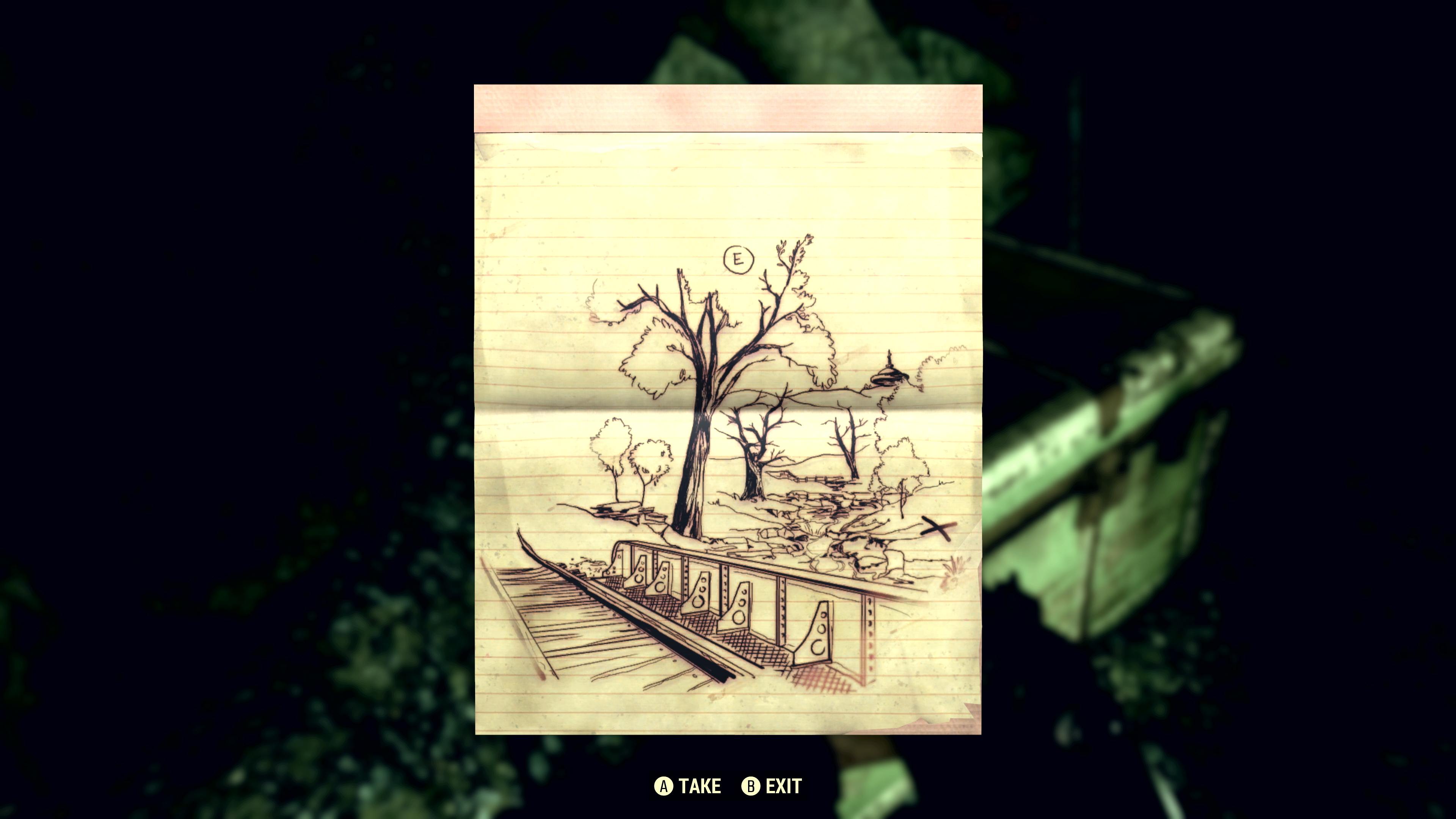
Chris: My body is ready. It's a complete gank of Red Dead Redemption's treasure maps—a crude drawing with an X and no context—but I'm fine with it. These kind of maps are great encouragement to explore without following a map marker and to pay attention to your surroundings. If there was nothing to do in the game beside find and use treasure maps, I'd be perfectly happy. Frankly, I don't even need the treasure.
Austin: I found "Forest Treasure Map #08" in a chest at the end of a dungeon (you can watch that here). Finding treasure maps in dungeons is something I never thought I'd do in a Fallout game, but now that I have, I never want to do anything else ever. The best part is that I was told this is one of the earliest maps in the game and that most other treasures are much more difficult to find. A map you find in the southeast corner of Appalachia may lead to treasure in the northwest corner. I can't wait to load myself down with maps and scour the gorgeous landscape for clues.
I actually want to build stuff
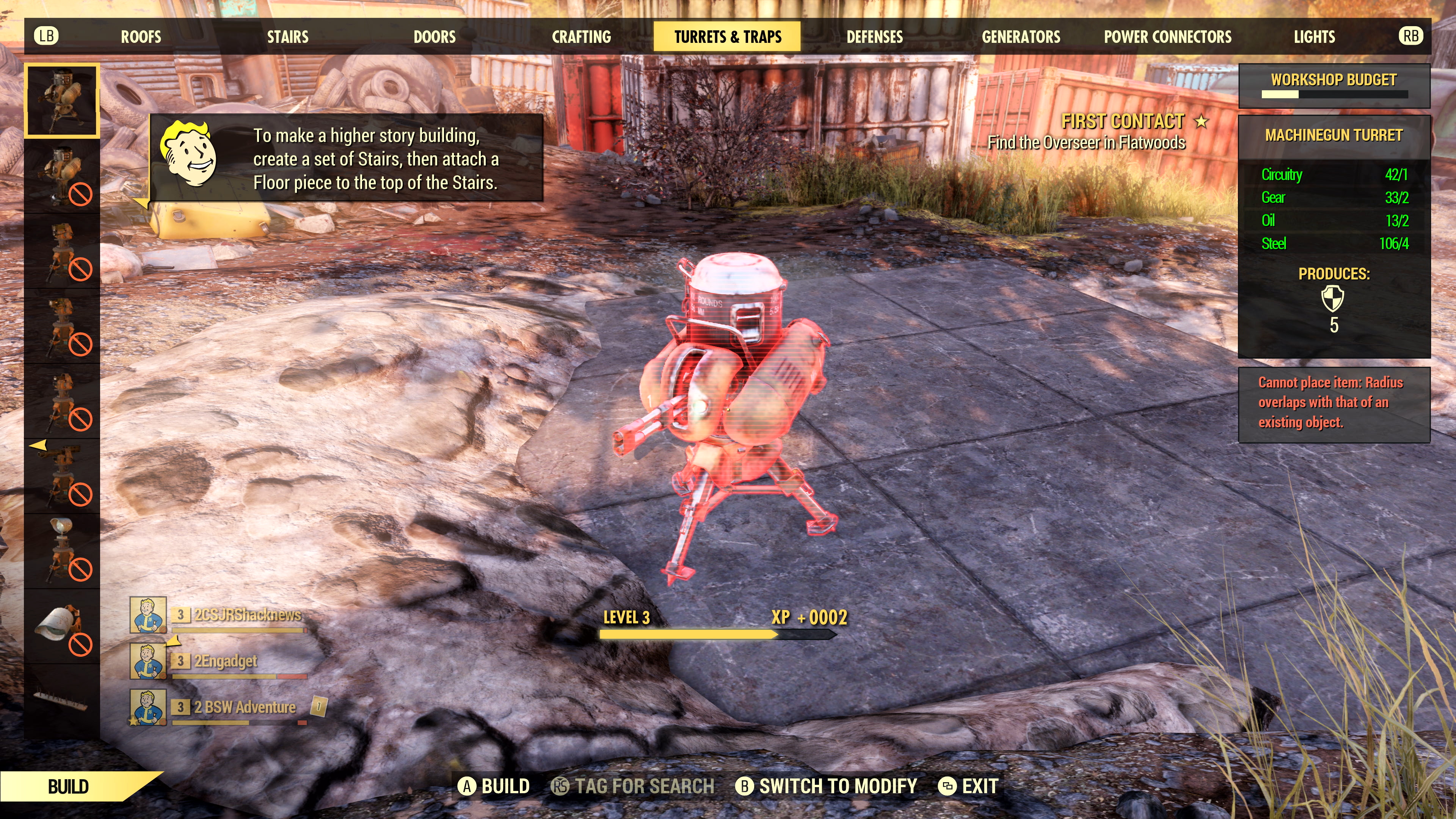
Austin: I tinkered with the settlement building in Fallout 4 for a few hours but quickly got bored of it. Building settlements didn't serve the main game in a meaningful way and maintaining them felt like a chore, so my settlements were pretty much just poorly defended scrap banks made from slapped-together prefab houses. Fallout 76 uses the same snap-on building system, but it applies it in more interesting and compelling ways that feed into the cycle of looting and shooting.
You have a personal camp you can plop down wherever, and you can add new utilities and features to it as you obtain materials and blueprints. You start off with a sleeping bag and a dream, but with a little effort you can add stuff like water purifiers and workbenches galore—things that will actually help you when you're out exploring and need to make camp. I like that camps are portable because it stops me from having to trudge back to the same old settlement every time I want to craft stuff, and I really like how camp upgrades are driven by discovery because I play Fallout games explicitly to explore.
Outside of camps, there are also a bunch of workshops dotted around the map that serve as special building sites. You can build pretty much whatever you want at workshops, most importantly extractors—these are little machines that generate resources like metal and concrete over time. You can only place extractors at workshops, so they're super valuable. And because other players can seize your workshops, there's clear motivation to build defenses like walls and turrets—things I never bothered with in Fallout 4, much to the dismay of my unfortunate citizens.
SPECIAL caps at level 50, but you can go beyond that
Austin: What is Fallout 76's level cap? Well, there's a soft cap at level 50 which is when you stop earning SPECIAL points, but the exp level cap is much higher. I was told players can potentially reach level 100 or more if they put the time in, and past level 50 leveling still rewards new perk cards, so it's worth it to keep going. I also learned that you can't reallocate your SPECIAL points, so spend them wisely.
Your photomode pictures are used as loading screens
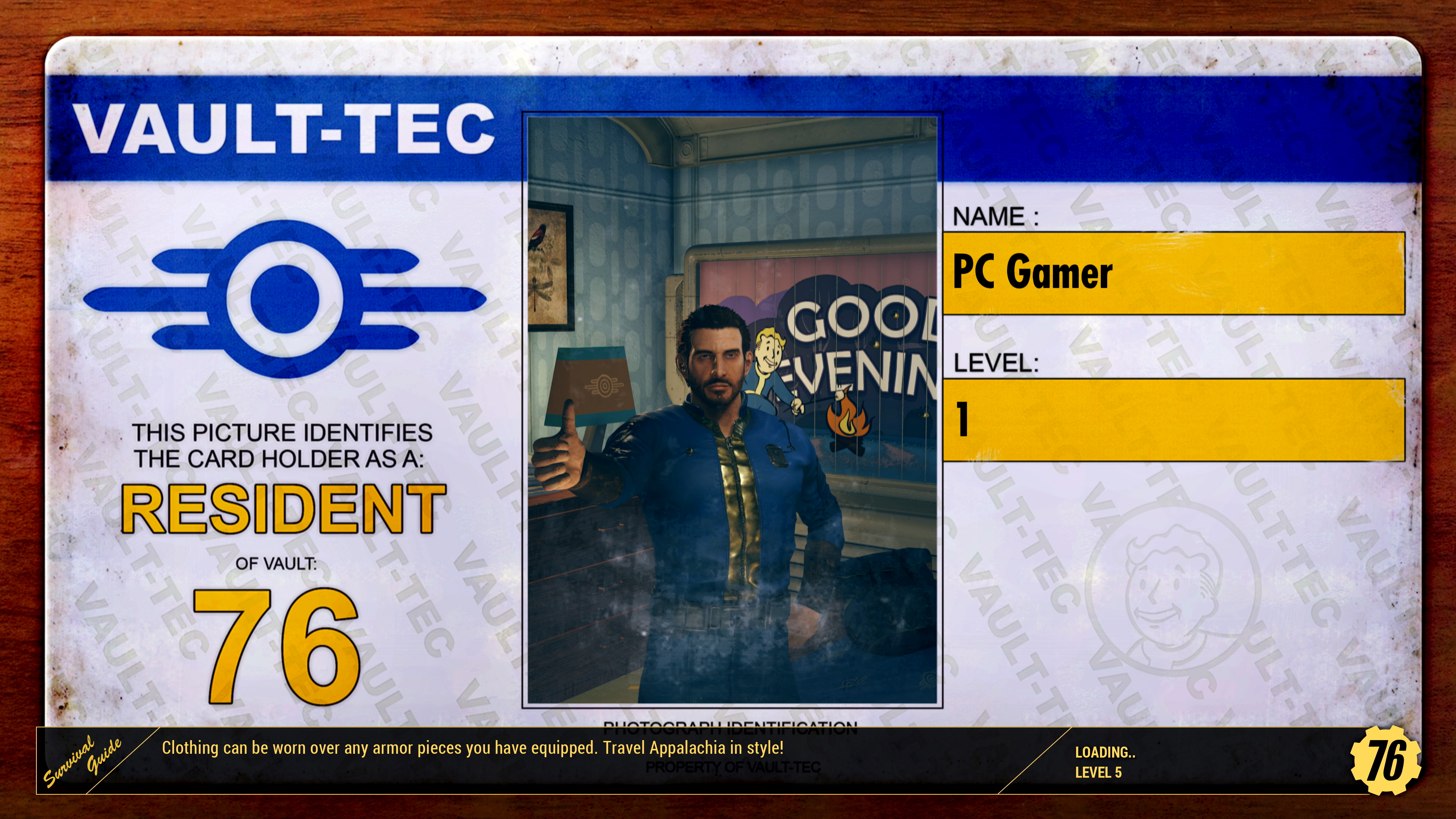
Chris: I feel like loading screens are few and far between in Fallout 76—we only encountered a handful of them in a few hours of play—and this is a nice touch. Hopefully there will be an easy way to share these photos with your Steam—er, Bethesda launcher friends, too.
You can't pet the cats
Chris: I didn't personally see any cats while playing (I did see a few opossums). I heard after the session that there are cats in Fallout 76, and I asked a developer if you can pet those cats, and was told that no, you can't pet those cats. I then advised the developers that between now and the game's release they should really add in the ability to pet the cats, because players are definitely going to want to pet the cats. Players always want to pet the cats. I want to pet the cats, too. (You can, apparently, kill and eat the cats.)
Every so often I wonder if any of the words I write about games have any sort of impact on how games are developed. Probably not. In fact, almost certainly not. But if I ever have any influence I hope it's in convincing developers to always, always let players pet cats (or dogs, or even opossums, for that matter). There's no shortage of ways to interact with creatures through violence, but there need to be more ways to interact with affection, even if it's just a little friendly scratching behind the ears or under the chin.

Chris started playing PC games in the 1980s, started writing about them in the early 2000s, and (finally) started getting paid to write about them in the late 2000s. Following a few years as a regular freelancer, PC Gamer hired him in 2014, probably so he'd stop emailing them asking for more work. Chris has a love-hate relationship with survival games and an unhealthy fascination with the inner lives of NPCs. He's also a fan of offbeat simulation games, mods, and ignoring storylines in RPGs so he can make up his own.

